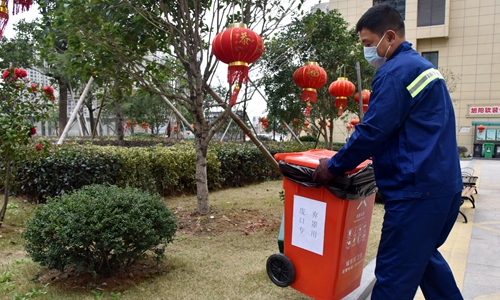HOME >> SOURCE,SPECIAL-COVERAGE
Virus crisis chills private firms
By Li Xuanmin and Chi Jingyi Source:Global Times Published: 2020/2/2 19:13:40
Wenzhou enterprises say they struggle to survive

A cleaner puts a trash bin for worn masks in a residential quarter at Wenzhou, East China's Zhejiang Province on Tuesday. Photo: cnsphoto
The thriving private economy of Wenzhou, East China's Zhejiang Province, is facing a chill, as the city, dubbed as the cradle of China's private entrepreneurship, is grappling with the rapid outbreak of the coronavirus.
Wenzhou now has the most coronavirus cases outside Central China's Hubei Province, the epicenter. Entrepreneurs in Wenzhou are already lamenting their lack of capital and the evaporation of export orders as factories suspend operations and the movement of people it strictly restricted.
"So far, the impact is within control… but the future is full of uncertainty," Ying Daijun, chairman of a lighting company based in Wenzhou, told the Global Times on Sunday. His company plans to restart production in late February.
A manager of a local ceramic decoration company surnamed Zeng told the Global Times that February is the annual off-season as everyone, including workers, goes home for the Spring Festival, and that's the reason why the impact has yet to become evident. Zeng's company has not decided when it will resume production.
But local entrepreneurs told the Global Times that if the virus is not contained within the first quarter, the damage to Wenzhou's private upstream and downstream industries would be "catastrophic."
"Our cash flow can only cover the rent for one to two extra months, and that comes out of the bottom line. That's the case for most small companies in Wenzhou. If production cannot get resumed in March, it would lead to a chain reaction that the local economy can ill afford," Ying said.
In 2019, private companies accounted for 99.5 percent of enterprises in Wenzhou and generated about 90 percent of the city's GDP.
Wenzhou is also known as China's trading hub. In late February, most foreign clients fly to the city to examine the merchandise and place new orders. But with the outbreak of the coronavirus, most of those trips were canceled. Some flights between Chinese and foreign cities have also been called off.
"Some [clients] told me that they will wait till the end of March. Otherwise, they will reroute supply chains to other destinations," Ying said, noting that if he doesn't secure foreign orders, the company's income would be slashed by more than half.
As of Saturday at midnight, Wenzhou, which is more than 800 kilometers from Wuhan, reported 265 confirmed cases of coronavirus infection, making the city the one with the most confirmed cases outside of Hubei.
As part of the effort to avert the spread of the deadly virus, local authorities announced stringent steps on Sunday to close roads and restrict residents' movements.
Some local businessmen, while showing understanding of the measures, also voiced worries that the policies could compound their financial woes by pushing up labor costs. "In fact, the most important thing is not orders, but how to ensure production," Zeng added.
The case of Wenzhou is a vivid display of how the coronavirus could wreak havoc on the Chinese economy, which has drawn increasing calls from industry insiders for a more swift response from government to help private companies, which are vulnerable to external shocks, to withstand the crisis.
Across China, private enterprises contribute over 50 percent of tax revenue, 60 percent of GDP, 70 percent of technological innovation and 80 percent of urban employment, the Xinhua News Agency has reported.
"The outbreak of the coronavirus is a 'black swan' event. If not dealt with properly, it will inflict irreparable harm on China's private sector," Tian Yun, vice director of the Beijing Economic Operation Association, told the Global Times.
He suggested local regulators should offer tax break and delay social insurance payments for private companies. Also, business associations should step in to negotiate possible rental exemptions.
So far, more than 20 real estate companies have released policies to reduce the rent for commercial tenants in 10 cities, Beijing News reported.
The city government of Suzhou, East China's Jiangsu Province, released preferential policies on Sunday to assist small and medium-sized enterprises to better weather the coronavirus onslaught, including preferential credit loans and rates for small and micro-sized businesses.
In addition, payment of social insurance charges and taxes could be postponed, and small and medium-sized enterprises renting state-owned houses can be exempted from rent for one month, the policies said.
Posted in: INDUSTRIES,MARKETS,FEATURE